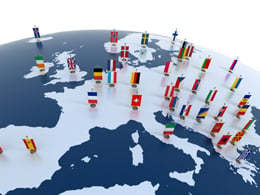 For the past two days, I’ve been in London at a J.P. Morgan European investment summit, and a fascinating time it has been.
For the past two days, I’ve been in London at a J.P. Morgan European investment summit, and a fascinating time it has been.
As investors, it's not so much the things we don't know that we need to be mindful of, but the things we don’t even know we don’t know. For Americans, how things really are in the rest of the world can easily fall into that category, so it’s been interesting to get some international perspective over the last couple of days.
Here are three of my key takeaways.
1. The U.S. remains the growth engine for the global recovery.
Almost everyone I’ve spoken with here has mentioned that the recovery depends on the U.S. Some say it with approval, others don’t, but the conclusion is well-nigh universal. The reasons behind the sentiment vary, but common elements include the recapitalized U.S. banking system and a flexible labor market. For all our problems, these are strengths the rest of the world wants to emulate. The U.S. recovery is seen as real and sustainable.
2. Europe is more fragile than we might think.
Although I turned negative on the euro some time ago, a number of participants here suggested that a breakpoint might be closer than I expected. According to some German interlocutors, the trigger could be whether or not Mario Draghi, the head of the European Central Bank, can push through a meaningful quantitative easing program. If not, the political environment may become even more toxic. Which brings us to . . .
3. European politics is becoming less and less supportive of the European project.
This is actually a special case of a wider problem—namely, as economic stress rises, countries become less able and less willing to make sacrifices for the common good. Arguably, the real intent behind Japan’s move to expand its quantitative easing program (apart from depreciating the currency) was to support its economy at the expense of, say, China’s—a position China has certainly thought about. Similarly, the confrontation between the European north and south has become focused on relative economic benefits.
In the meantime, voters are being told that their suffering is not the fault of the party in power, but of Germany (or Italy, or France, or Europe, or something—anything—else). The upshot is that nationalist parties are rising around the world (the National Front in France, the Alternative for Germany, and so on). Even countries where that’s not the case, such as China and Japan, are acting more nationalistic.
Will things get better before voters run out of patience? Talking with citizens of many countries, it doesn’t seem very likely. Even in the UK—which has done the best of any of the European countries, with the possible exception of Germany—many people I talked with see a real chance that the country might exit the European Union were a referendum to be called as planned in 2017.
All in all, it’s been a deeply interesting look at a part of the world I don’t get to see all that often—and one that reinforces my conviction that, for the moment, and for all of our problems, the U.S. is the place to be.


 Print
Print


